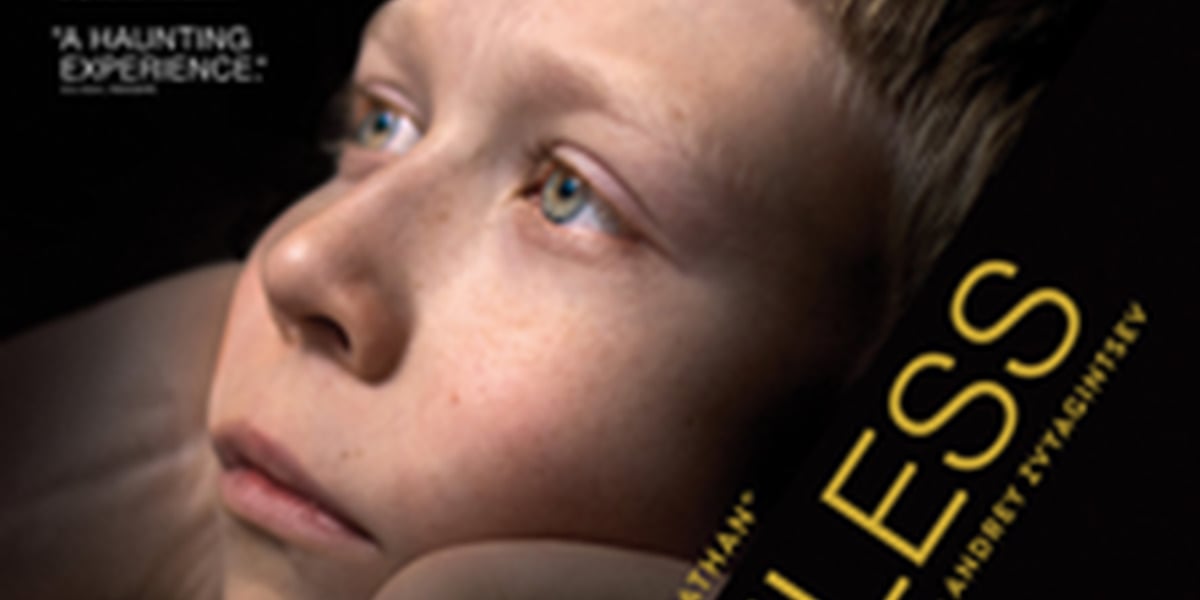Never has a more profoundly pessimistic movie such as “Loveless” been made in my memory. The Oscar-nominated Russian film is set in the bleak midwinter, where trees are stripped of greenness and heavy snow extinguishes all sign of life. There’s talk of the apocalypse on the radio. A thread of construction tape swings from a tree. We’re shown a cluttered apartment of glass doors, mirrors, and windows, as if to heighten the tones of what can only be described as glacial. The cinematography is beautiful and very, very dismal.
The real action begins as Zhenya and Boris, two couples on the edge of divorce, bicker and argue about who will take custody of their child, Alexey. Neither one are enthused to do so, and twelve-year-old Alexey realizes this after overhearing the bitter exchange. Zhenya is a smartphone addict who has a more intimate relationship with phones than with people; she admits that she is “repulsed” at her unwanted child, and one can’t help but be stricken by quiet moral horror. Boris is a lame, uninterested businessman whose sole anxiety is over whether he’ll lose his job for getting a divorce, due to his corporate policy. His infidelity has resulted in his new lover’s pregnancy and the divorce. While we’re led through the exposition of the parents, it feels as if the ghost of Alexey hovers over every scene, demanding attention, demanding love.
In fact, the only time we get a glimpse of Alexey is in the first few moments, as he is soon revealed to have disappeared: he’s been out of school for two days, something that the negligent parents only find out much later. The police get involved, but even then the search is done only according to procedure, and the police have little sympathy for Zhenya. The little, rare touch of humanity in the film is a group of volunteers trained to find missing persons without any self-interest. They help the parents look for Alexey, but stumbles across a roadblock when neither parent know enough crucial information about their son for the search.
Director Andrey Zvyagintsev has created an unspeakable tragedy, forthright about his vision of what a loveless world, driven by duty and not much else, would look like. How loveless and barren must a household be, he questions, for a child to choose an abandoned, post-apocalyptic building over it?
Even when Zhenya professes that she has finally fallen in love for the first time in her life, the conversation leads to more doubts: if she is unable to love a helpless creature she has birthed and weaned, how genuine is this love for a new man? Zvyagintsev, however, doesn’t put the weight of the moral judgment on the mother solely; the father, Boris, is shown as an incompetent, emotionally sterile man who displays no great affection for anyone.
At the end of the movie, Boris is with another child, his own, resembling Alexey in his blonde hair. The television echoes the wreckage of war while Boris puts his child in a crib, trying to quiet him. Zhenya and her new lover barely speak. Relationships, again, have turned loveless. That humans are incapable of love is not what Zvyagintsev wants us to take away from the movie; merely to recognize the potential that humans have to be as loveless as we are loving. When we lose love—and it’s likely that a lot of us have already have—we lose what’s most human in us, and that will lead to the end of the human race. It’s not very humanistic in its view, and is perhaps the reason why the empathetic “A Fantastic Woman” won over “Loveless” in the Oscars in the past (time frame). Nevertheless, walking down Zvyagintsev’s carefully-crafted path to destruction then rising above it is not only a journey worth having, but almost a duty to our race. The golden-haired boy might still be wandering around in our midst, waiting to be found.
Contact Elaine Kim at elainekm ‘at’ stanford.edu.
